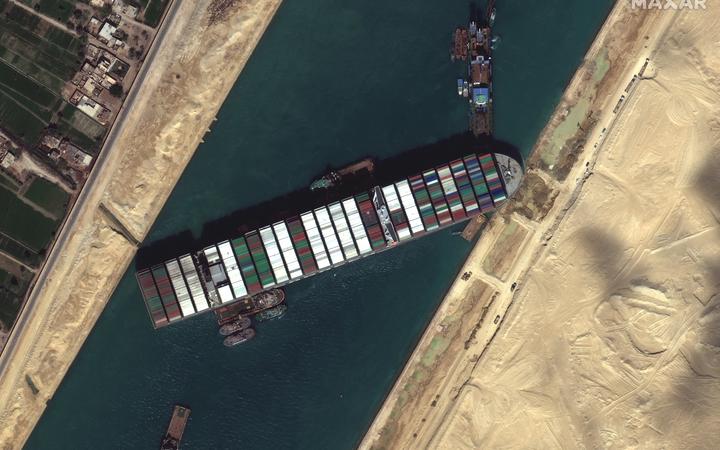There are fears the Ever Given ship’s six-day occupation of the Suez Canal could spell a domino effect in New Zealand’s shipping supply chains.
 Tug boats and dredgers on March 27, 2021, attempting to free the ship Ever Given, which was lodged sideways and impeding all traffic across Egypt’s Suez Canal. Photo: Satellite image 2021 Maxar Technologies / AFP
Tug boats and dredgers on March 27, 2021, attempting to free the ship Ever Given, which was lodged sideways and impeding all traffic across Egypt’s Suez Canal. Photo: Satellite image 2021 Maxar Technologies / AFPBefore the Ever Given was refloated today, locals, importers and exporters were already preparing for potential months worth of headaches.
The skyscraper-sized ship has been blocking as many as 50 ships a day from getting through their main route between Europe and Asia, and has more than 300 ships waiting in traffic either side of it.
The breakthrough happened after diggers removed 27,000 cubic metres of sand. It’s unclear how soon the waterway will be open to traffic again.
One of New Zealand’s most frequently used shipping companies, Maersk, has 27 ships stuck.
The New Zealand Council of Cargo Owners has confirmed New Zealand containers have been caught up in the chaos, although exactly how many and who owns them was not yet clear.
Auckland University professor of operations and supply chain management David Robb said it could take “considerable time” to clear the Suez.
“Probably another week to get through that backlog,” he said.
There is also the issue of raw materials stuck in the queue, bound for Europe and Asia to be assembled into a product before being sent to Aotearoa.
For example – hypothetically – if a container-load of peanuts is stuck in the Suez at the moment, then a New Zealand company that imports peanut butter from Europe might be impacted further down the track.
Prof Robb said it could be weeks before things returned to normal.
“It could be anything – we just don’t know at the moment, made in Asia, Australasia – coming into New Zealand may be delayed further. This is largely because our current supply chains are at absolute maximum,” he said.
“There’s longer lead times so we’ve got low inventories in many industries.”
However, the biggest problem is not delays to existing ships in the queue: when the canal is unblocked, there are fears the backlog will converge at ‘hub’ ports in Malaysia and Singapore, which is where a lot of New Zealand’s trade passes through.
It means New Zealand imports and exports that go nowhere near the Suez could also be caught up in the chaos.
Customs Brokers and Freight Forwarders Federation co-founder Chris Edwards said the congestion could then land on our doorstep.
“During Covid, we had the same situation. [Ships] were bunching up and then they would suddenly dump large volumes of cargo at our ports here in New Zealand,” he said.
Prof Robb said those cargo dumps were still being distributed.
“Importers and exporters have already got lengthy delays. Even if a container arrives at the Port of Tauranga, you’re waiting around three weeks to move it up to Auckland on rail. So it’ll just be another headache in what is already a pretty complicated supply chain.”
Ports of Auckland general manager commercial relationships Craig Sane said the full extent of any delays would not be clear until long after Ever Given was removed.
“With the extension to supply chains in terms of time and cost, I would imagine there’d be quite a few stressed cargo owners out there at the moment.”
Meat Industry Association chief executive Sirma Karapeeva said exporters in New Zealand were doing what they could to cope and prepare.
“Our companies are doing what they do best. They are talking to their shipping suppliers, shipping lines, working very closely with their customers offshore,” she said.
Edwards said a year into the pandemic, communication was improving between shipping companies and suppliers.
